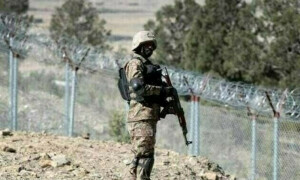Tensions Rise as Pakistan and India Exchange Fire in Kashmir
For the third consecutive night, Pakistani and Indian forces engaged in cross-border firing in the contested Kashmir region, officials confirmed on Sunday. This escalation has further strained relations between the two nuclear powers, reaching a concerning low point in recent years.
India has placed blame on Pakistan for allegedly backing “cross-border terrorism,” pointing to a recent deadly assault on civilians in Kashmir, the worst in over two decades.
Islamabad has refuted these accusations, dismissing any attempts to link Pakistan to the attack as “baseless” and pledging to respond to any hostile actions from India.
Following the tragic deaths of 26 individuals at a Pahalgam tourist destination on April 22, Indian security forces have initiated a large-scale search operation to apprehend those responsible.
The Indian military reported on Sunday that Pakistani forces had initiated “unprovoked” small arms fire along the Line of Control (LoC). The LoC serves as the demarcation between the two nations.
According to the military statement, Indian troops responded with appropriate small arms fire.
As of now, there has been no confirmation from Pakistan regarding the latest exchange of fire.
Indian law enforcement has released wanted posters featuring three men allegedly affiliated with the Lashkar-e-Taiba group.
India’s federal home ministry has transferred the investigation of the attack to the National Investigation Agency, a counter-terrorism focused organization.
The agency is currently gathering forensic evidence, conducting interviews with eyewitnesses, and thoroughly examining entry and exit routes.
According to a statement, the agency is meticulously questioning eyewitnesses in order to reconstruct the sequence of events surrounding this devastating terror attack in Kashmir.
Demolished Residences
Since 1947, Kashmir has remained divided between India and Pakistan. Both nations lay claim to the entire territory but administer separate portions.
On Saturday, in Indian Illegally Occupied Kashmir, soldiers reportedly bombed the family residence of one of the suspected individuals involved in the Pahalgam attack.
The home of Farooq Ahmad Tadwa, located in the Kupwara district, was destroyed by authorities as part of a series of demolitions targeting the residences of alleged militants.
Since the Pahalgam attack, a police official, speaking anonymously on Sunday, informed AFP that nine residences have been bombed.
Following the attack in Occupied Kashmir, New Delhi took measures such as suspending a water-sharing agreement, declaring the closure of the primary land border crossing with Pakistan, reducing diplomatic relations, and revoking visas for Pakistani citizens.
In retaliation, Islamabad has mandated the expulsion of Indian diplomats and military advisors, nullified visas for Indian citizens (excluding Sikh pilgrims), and closed the main border crossing from its side.
The United Nations has appealed to both nations to exercise extreme restraint to ensure that issues can be addressed through peaceful and meaningful discussions.
Analysts suggest that a military response from India remains a possibility.
The Indian Express newspaper cited a senior government official on Sunday as stating that military retaliation is anticipated, and the nature of the response is under deliberation.
In 2019, a suicide bombing resulted in the deaths of 41 Indian soldiers in Kashmir, prompting retaliatory Indian air strikes within Pakistan and pushing the two nations to the brink of full-scale conflict.



Comments (0)
No comments yet. Be the first to comment!
Leave a Comment